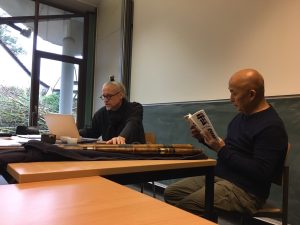On December 19, 2024,, I was invited by Prof. He Zhanpen to discuss with him and many of his graduate students at the Department of Philosophy of the Free University of Berlin about the documentary novel "Wuhan" and the Tao of Lao Zhuang.
One of the important topics was that the origin of the "Wuhan virus" was in an ancient cave in a deep forest unknown to the modern world, parallel to human time and space, and had coexisted for tens of thousands of years without any interaction or harm to each other, but it was finally discovered by a Chinese virologist who had traveled over thousands of mountains and rivers and extracted the bat virus from bats and made a large number of specimens to be used as the basis for the study. which were transported back to Wuhan in the name of scientific research, eventually causing an unprecedented human catastrophe!
Wuhan always explores the way of coexistence between human beings and nature, and repeatedly questions the legitimacy of scientific research under a dictatorship. Its significance became more and more apparent the later the book was published - and so did Ho and his students, who were renowned for their studies of the philosophies of Lao Zhuang and Heidegger.
With their notebooks and the German edition of Wuhan in their hands, it was an honorable moment for the exiled professional writer.
武漢與道
-
2024年12月19日,我受何乏筆教授的邀請,在柏林自由大學哲學系,與他和他的不少研究生一起,討論紀錄小說《武漢》與老莊之道。
其中一個重要的論題,是“武漢病毒”的原鄉本在不為現代世界所知的深山老林的遠古溶洞裏,與人類的時空平行,並共存了數萬年,彼此從未有任何交集和傷害,最後卻被踏遍千山萬水的中國病毒學家發現,從蝙蝠身上提取了蝙蝠病毒,並製作了大量標本,以科學研究的名義空運回武漢,最終釀成史無前例的人類浩劫。

《武漢》始終在探討人類與自然的共存之道,一再質疑獨裁體制下的科學研究的正當性。它的重要性,越到後來越得以凸顯 -- 以研究老莊和海德格爾哲學而著稱的何乏筆和他的學生們也這樣認為。
他們手中均有筆記本和德文版《武漢》,這是一個流亡職業寫作者的光榮的時刻。



